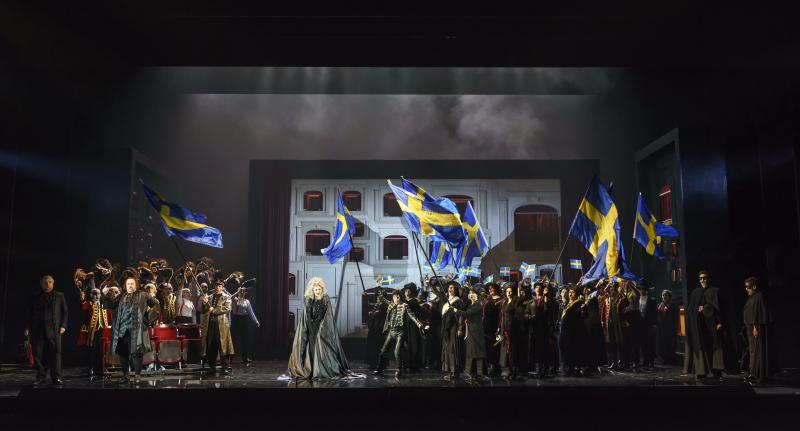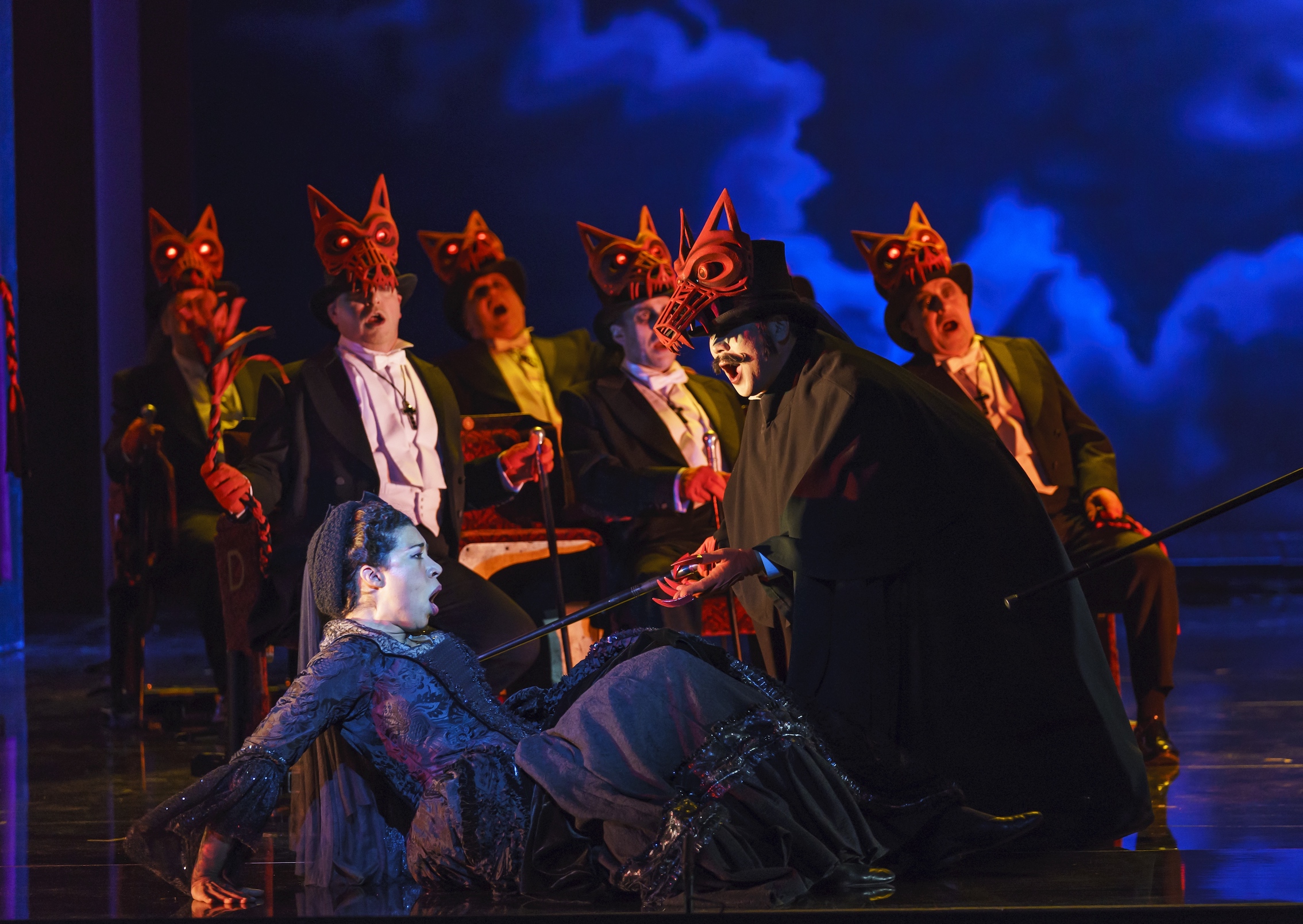Un ballo in maschera, Welsh National Opera review - opera as brilliant self-parody | reviews, news & interviews
Un ballo in maschera, Welsh National Opera review - opera as brilliant self-parody
Un ballo in maschera, Welsh National Opera review - opera as brilliant self-parody
Middle-period Verdi watchable, listenable and sometimes laughable

Why is Un Ballo in maschera not as popular as the trio of Verdi masterpieces – Rigoletto, Traviata, Trovatore – that, with a couple of digressions, preceded it in the early 1850s? Its music is scarcely less brilliant than theirs, and if its plot is on a par of absurdity with Trovatore’s, it is at least, on the whole, more fun.
Perhaps the best-known fact about Ballo is that Verdi was forced by the Rome censorship to relocate Scribe’s libretto from historical Stockholm, 1792, to a mythical 17th century Boston, and to substitute a Governor for the Swedish king; and this provokes Pountney into a somewhat surrealist critique of the whole concept of kingship. To be more exact, kingship for him is a faded ghost that appears only fleetingly at the very end, when the murder victim isn’t the once-and-no-longer king, Riccardo, at all but a chorus-member togged up as a skeleton with a crown. It would be interesting to know how he explained this to our own future king, who was seated beside him in a stalls box.
Parodied or not, 'Ballo' is a gift for the WNO chorus, and they seize it with all hands
At other times we might be witnessing not a parody of royalty, so much as a Gilbertian satire on operatic convention itself. The choruses of conspirators, witch’s acolytes, disguised sailors and (at the ball) fancy-dress skeletons all slope around in a ludicrous choreography that recalls nothing so much as The Pirates of Penzance, while the witch Ulrica’s mumbo-jumbo might well have been imported from Ruddigore. The chief conspirators (Jihoon Kim and Tristan Hamilton), dark-voiced and black-cloaked, would be arrested on sight in normal life. Bucket-seats, of a somewhat older vintage than the ones we ourselves are occupying, pop up in ridiculous places: in what can only be described as Ulrica’s waiting-room, and at the gallows, where Amelia’s torments are observed by a sinister audience of conspirators in Davey-lamp wolves heads.
All this, I might add, is brilliantly watchable and spectacularly designed by Raymond Bauer (sets), Marie-Jeanne Lecca (costumes) and Fabrice Kebour (lighting). Occasionally one might feel distracted – as often with Pountney – by the need to tease out the significance of this or that image (long ago he read Freud before directing Hansel and Gretel). On the other hand, he remains one of our most musicianly directors, one who knows how to use space to respond to musical movement, so that this most mobile of Verdi’s scores enjoys all the physical vitality it deserves.

It also, more excitingly, gets the singing it needs. Outstanding is Mary Elizabeth Williams’s Amelia, a morose, somewhat one-dimensional role with, though, rivetting, difficult, beautiful music over a big range, much exposed in the gallows scene here by placing her a good deal downstage with her back to the horrors (pictured above) . She never puts a foot wrong; this is wonderful Verdi singing. The Riccardo, Gwyn Hughes Jones, is likewise completely on top of his more vivid part, taxed only by the rapid patter of the first act, and occasionally thinning his tone beyond the strictly beautiful in pursuit, I suppose, of the coarser aspects of this fun-loving ex-prince.
Roland Wood is impressive in Renato’s two big arias, slightly colourless elsewhere. Julie Martin du Theil sparkles as a punk, leather-clad Oscar. Intriguing how Verdi explores the irony of this Offenbachian intruder on Italian melodrama, so much more successfully, in my view, than with the ghastly Preziosilla in La Forza del destino. Only Sara Fulgoni’s Ulrica disappoints vocally, though we see a lot more of her, from curtain-up onwards, than Verdi decrees, as she wafts in and out from scene to scene, another of those irritating “watcher” or alter ego figures without which it seems that no opera director dares face an audience these days.
Parodied or not, Ballo is a gift for the WNO chorus, and they seize it with all hands, especially in the irresistible first act, a sort of Fledermaus before the fact. As always, too, the orchestral playing is top class, under the indispensable Carlo Rizzi, who comes with the scenery in Verdi these days, and more than welcome.
The future of Arts Journalism
You can stop theartsdesk.com closing!
We urgently need financing to survive. Our fundraising drive has thus far raised £49,000 but we need to reach £100,000 or we will be forced to close. Please contribute here: https://gofund.me/c3f6033d
And if you can forward this information to anyone who might assist, we’d be grateful.

Subscribe to theartsdesk.com
Thank you for continuing to read our work on theartsdesk.com. For unlimited access to every article in its entirety, including our archive of more than 15,000 pieces, we're asking for £5 per month or £40 per year. We feel it's a very good deal, and hope you do too.
To take a subscription now simply click here.
And if you're looking for that extra gift for a friend or family member, why not treat them to a theartsdesk.com gift subscription?
more Opera
 Tosca, Welsh National Opera review - a great company reduced to brilliance
The old warhorse made special by the basics
Tosca, Welsh National Opera review - a great company reduced to brilliance
The old warhorse made special by the basics
 BBC Proms: The Marriage of Figaro, Glyndebourne Festival review - merriment and menace
Strong Proms transfer for a robust and affecting show
BBC Proms: The Marriage of Figaro, Glyndebourne Festival review - merriment and menace
Strong Proms transfer for a robust and affecting show
 BBC Proms: Suor Angelica, LSO, Pappano review - earthly passion, heavenly grief
A Sister to remember blesses Puccini's convent tragedy
BBC Proms: Suor Angelica, LSO, Pappano review - earthly passion, heavenly grief
A Sister to remember blesses Puccini's convent tragedy
 Orpheus and Eurydice, Opera Queensland/SCO, Edinburgh International Festival 2025 review - dazzling, but distracting
Eye-popping acrobatics don’t always assist in Gluck’s quest for operatic truth
Orpheus and Eurydice, Opera Queensland/SCO, Edinburgh International Festival 2025 review - dazzling, but distracting
Eye-popping acrobatics don’t always assist in Gluck’s quest for operatic truth
 MARS, Irish National Opera review - silly space oddity with fun stretches
Cast, orchestra and production give Jennifer Walshe’s bold collage their all
MARS, Irish National Opera review - silly space oddity with fun stretches
Cast, orchestra and production give Jennifer Walshe’s bold collage their all
 Káťa Kabanová, Glyndebourne review - emotional concentration in a salle modulable
Janáček superbly done through or in spite of the symbolism
Káťa Kabanová, Glyndebourne review - emotional concentration in a salle modulable
Janáček superbly done through or in spite of the symbolism
 Buxton International Festival 2025 review - a lavish offering of smaller-scale work
Allison Cook stands out in a fascinating integrated double bill of Bernstein and Poulenc
Buxton International Festival 2025 review - a lavish offering of smaller-scale work
Allison Cook stands out in a fascinating integrated double bill of Bernstein and Poulenc
 Tosca, Clonter Opera review - beauty and integrity in miniature
Happy surprises and a convincing interpretation of Puccini for today
Tosca, Clonter Opera review - beauty and integrity in miniature
Happy surprises and a convincing interpretation of Puccini for today
 Hamlet, Buxton International Festival review - how to re-imagine re-imagined Shakespeare
Music comes first in very 19th century, very Romantic, very French operatic creation
Hamlet, Buxton International Festival review - how to re-imagine re-imagined Shakespeare
Music comes first in very 19th century, very Romantic, very French operatic creation
 Falstaff, Glyndebourne review - knockabout and nostalgia in postwar Windsor
A fat knight to remember, and snappy stagecraft, overcome some tedious waits
Falstaff, Glyndebourne review - knockabout and nostalgia in postwar Windsor
A fat knight to remember, and snappy stagecraft, overcome some tedious waits
 Salome, LSO, Pappano, Barbican review - a partnership in a million
Asmik Grigorian is vocal perfection in league with a great conductor and orchestra
Salome, LSO, Pappano, Barbican review - a partnership in a million
Asmik Grigorian is vocal perfection in league with a great conductor and orchestra
 Semele, Royal Opera review - unholy smoke
Style comes and goes in a justifiably dark treatment of Handelian myth
Semele, Royal Opera review - unholy smoke
Style comes and goes in a justifiably dark treatment of Handelian myth

Add comment